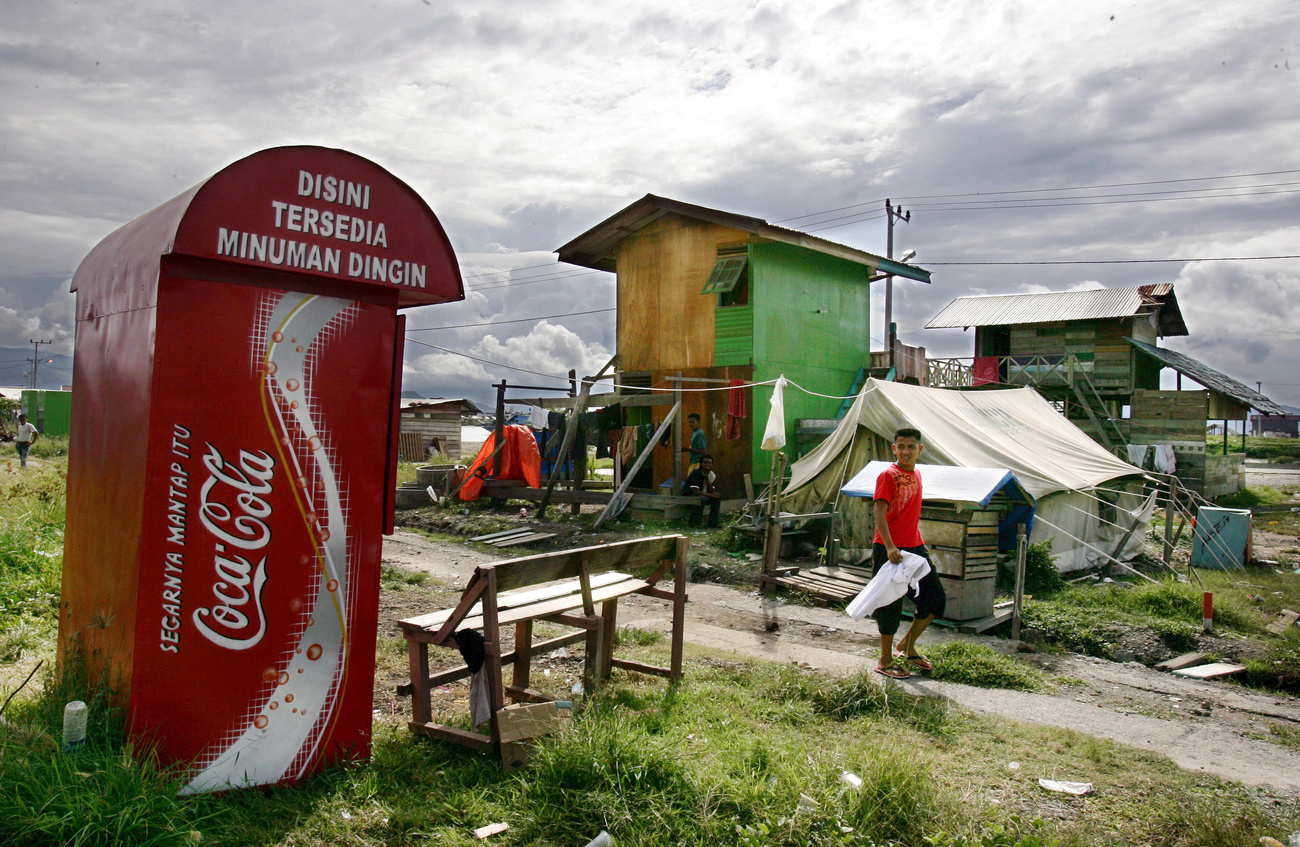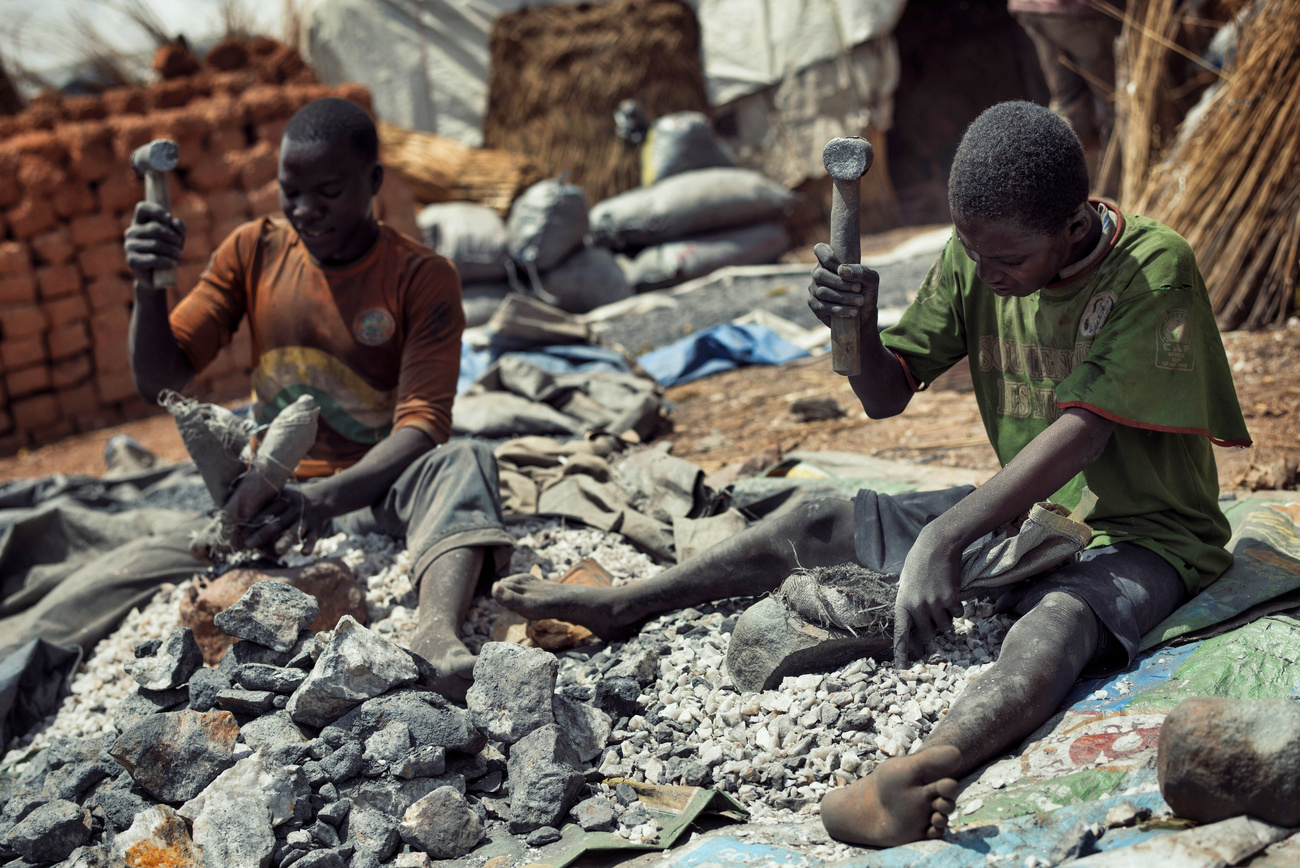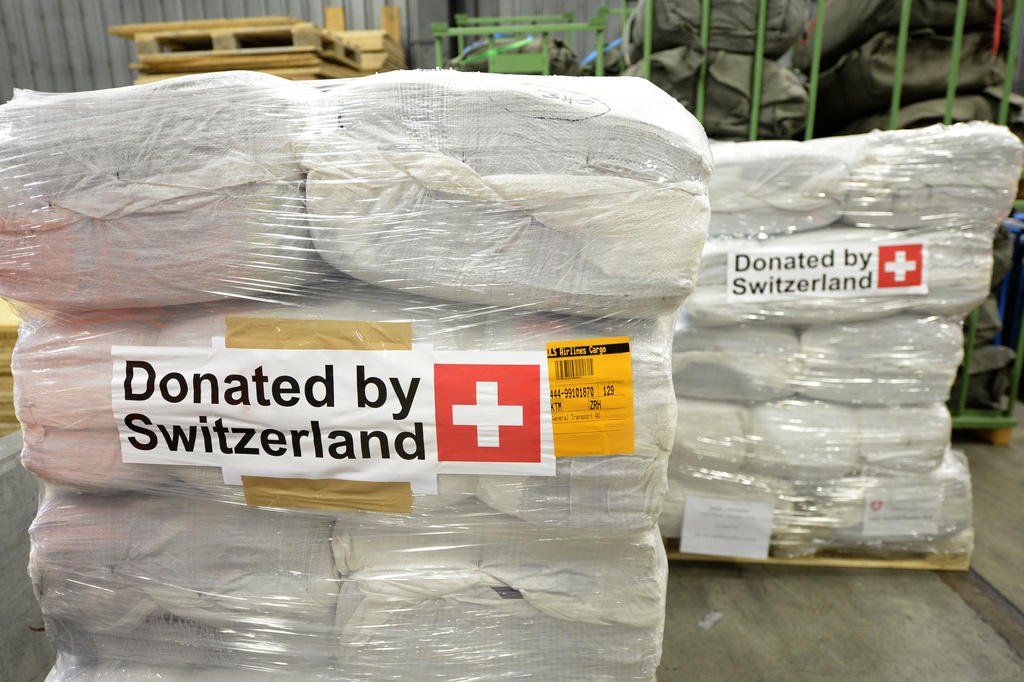The risky business of foreign aid

The Swiss government wants to work more with big companies in its aid to poorer parts of the world. The experience of other countries shows it should tread carefully.
“The potato must go to Africa.”
That’s how a German government official endorsedExternal link an aid project launched several years ago meant to popularise the farming of European potato varieties in sub-Saharan Africa. The project raised eyebrows. Planting European potato varieties required massive fertilisation, non-governmental aid groups argued. Once hooked on the potatoes, these small-scale producers would need a steady supply of seeds and fertiliser.
Observers wondered who had more to gain from the aid project paid for by European taxpayers: its recipients or the agribusinesses providing training, seeds, machines, pesticides and fertilisers.
This is the conundrum Swiss government officials now face as they decide how to move forward with their new foreign aid strategy. The benefits of collaboration with multinationals are clear: donor governments benefit from corporate money, skills, technology and scale.
But at the same time, cautionary tales like the potato project show that it should proceed with caution.
The Potato Initiative Africa was part of the German Food Partnership launched in 2012 with much fanfare. Some 30 private companies would cover some of the project budget and contribute their expertise and equipment to poorer countries to help improve nutrition and farmer incomes in developing countries.
While some projects continue, the partnership appears to have since been quietly shelved after it drew a swell of criticism from NGOs, which accused it of being a tool to open markets for European agribusinesses.
“If you want to fight poverty and hunger you have to support the poor and starving, not help agricultural corporations do business,” Marita Wiggerthale, a food security expert at Oxfam Germany, said in an interviewExternal link critiquing the partnership.
Farmer yields increased according to some reports but evidenceExternal link also showed farmers became increasingly dependent on multinationals for seeds and fertiliser. According to Wiggerthale, in one project in Kenya, Bayer sold over 20% more pesticides to small-scale farmers thanks to training sessions.
Filling a gap
Debate about how much the private sector should be involved in development aid has been around for decades. Yet recently public scrutiny of such deals has intensified.
Governments have had to justify their foreign aid expenditures to increasingly sceptical electorates. By looping in multinationals, they can reduce the cost of foreign aid and at the same time take credit for boosting opportunities for their own domestic industries.
Leaders at the United Nations, the World Bank and other international organisations have also reached out to the private sector to compensate for shortfalls in funds.
“Almost everyone is trying to do more with the private sector partly because there is a need for more sustainable solutions rather than just short, one-off projects,” said Melina Heinrich-Fernandes, who has worked in the private sector development field for over ten years. “The private sector can keep projects going forward when aid stops.”
Heinrich-Fernandes is a deputy coordinator of the Donor Committee for Enterprise Development, a group of donors that shares knowledge on how to work with the private sector more effectively. She said that nearly all of the 24 donors she works with have made private sector engagement a core part of their future aid strategy.
“The debates are less about whether to work with the private sector and more on how to do it effectively,” she said.
The Swiss have also made this a top priority in its latest five-year strategyExternal link approved in February, which says the government wants to “fully harness the potential of the private sector”. The Swiss Agency for Development and Cooperation (SDC) told swissinfo.ch that it will increase the number of collaborations and the financial volume of its portfolio of projects with the private sector that currently stands at around 5%.
At the same time, multinationals seeking new pockets of growth have rushed to expand their presence in markets in the developing world. Participating in government aid projects is a no-brainer to them: aid agencies help create conditions that make it easier to do business especially in politically unstable regions.
Strings attached
But, the swell of projects and the increasingly cozy ties between aid agencies and multinationals in recent years have many NGOs concerned. “Governments are effectively subsidising the private sector and redirecting scarce development money away from countries and sectors that need it the most,” said María José Romero, a policy and advocacy manager for the Eurodad group, a network of European NGOs based in Brussels.
She points to recent figuresExternal link that show much of the aid used to attract more private funds is destined for middle income countries like Brazil, Serbia and Turkey that are more attractive to businesses rather than least developed countries.
Romero is also worried that too much allying aid to donor country business interests risks neglecting local solutions to local needs and reinforces dependence on the developed world. Eurodad found that more aid is now being provided on conditions that local groups purchase equipment or supplies from the donor country.
In 2018, donors tied nearly 20% of bilateral aidExternal link to suppliers from their own country, up from 15.4% the year before. The US far exceeds this with about 40% of aid tied to domestic suppliers.
“Why should aid be being used to basically help the private sector expand into different markets?” said Daniel Willis, a policy and campaigns manager with Global Justice Now, a British aid advocacy group.
“I’m all for believing that the private sector could play a positive role in some way,” he said. “It is just that the private sector often doesn’t really want to play a positive role.”
Some agencies such as that in the Netherlands aren’t shy about trying to open doors for Dutch companies. In 2018, the Dutch and Ethiopian governments signedExternal link a EUR 40 million contract with Royal Philips for the Dutch health technology company to build a cardiology hospital in Addis Ababa.
In Great Britain, the government has riled activistsExternal link over signs that economic interests are driving its aid agenda. The government has defended the move as a more pragmatic use of aid money.
The Swedish International Development Cooperation Agency (Sida) makes a point not to tie aid to preferential access to markets for Swedish companies and almost always works with an NGO or UN agency in implementation.
One reason for this approach, Maria Stridsman, Deputy Director of Partnership and Innovation at Sida, told swissinfo.ch, is because “the values behind aid are solidarity and the responsibility for rich countries to work for a sustainable world not to promote the Swedish private sector”.
What also concerns many NGOs is the way donors, including the Swiss, are turning into banks with financial instruments like guarantees, shifting some risk of market entry from companies to public purses. This risked pushing recipient countries further into debt when projects fail, said Romero.
Although there’s no consensus on how to track aid money spent through private channels, some figuresExternal link reveal that blended finance deals whereby public money is used to attract private capital went from around 70 in 2007 to over 500 in 2018.
Change from within
Donors are trying to ward off some of the criticism by being more selective about which companies they work with, excluding sectors like tobacco or weapon manufacturers from the list of possible partners. However, donors can still get mixed up in unsavoury business.
The Swiss government’s ties with Nestlé have also drawn ire because of their years of aggressive marketing of infant formula and putting pressure on local water sources. Nestlé is one of the 30 or so companies involved in the Swiss Cocoa PlatformExternal link, launched with CHF9 million from the Swiss government, which wants to help Switzerland import all of its cocoa from sustainable sources.
Heinrich-Fernandes from DCED told swissinfo.ch that aid agencies have been working on guidelines to ensure that corporate partners uphold standards of responsible business. But she noted that it is a challenge with such complex global supply chains.
“No organisation is perfect – including companies. Should donors just refrain from engaging with them?” she asked. “Or should they work with them and help them improve?”
Donors like Sida argue that this is precisely one of the reasons to work with companies – to help change practices and make them aware that issues like gender equality and access to clean water matter.
Willis of Global Justice Now isn’t convinced though. “I think it come down to the question of what you think development aid is for,” he told swissinfo.ch. “We’d argue that first and foremost it should be tackling inequality and providing free education and healthcare.”
“The private sector is not very good at doing those things in a just and inclusive way,” he said.

In compliance with the JTI standards
More: SWI swissinfo.ch certified by the Journalism Trust Initiative




Join the conversation!